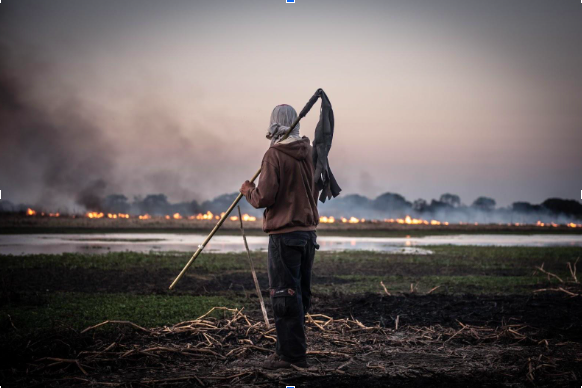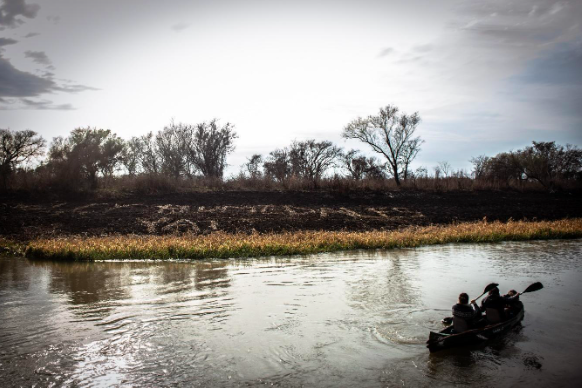Demands for ecological and environmental justice in the conflict of the Paraná Delta
Marianela Laura Galanzino, UNL-CONICET
2024
For some decades now, the perspective of Rights of Nature has been gaining ground in Latin America. While this approach has seen significant development in these territories as well as in other countries of the Global South, it has also had a great impact worldwide. Currently, we can speak of Rights of Nature as a global movement. The recognition of Rights of Nature encompasses a series of discussions regarding granting rights to animals (either individually or by species), to certain ecosystems in particular, to nature in general, or even to newer categories of subjects, such as future generations. In these debates, the Latin American territory has contributed a large number of experiences that have been conducted through different means: jurisprudence, constitutional texts, or national laws. On some occasions, demands for the recognition of rights for non-human entities arise within socio-environmental conflicts.
This is the case of the conflict in the Paraná Delta sparked by a large number of fires in Argentine wetland areas. The demands of the different social actors are directed against an absent government management that led to the large-scale destruction of life in the Paraná Delta, causing immeasurable damage to biodiversity, fundamental rights to life, and the health of those who live there. Wetlands are essential ecosystems for the sustainability of life, as they provide multiple ecosystem services. The Paraná Delta, which covers 22,587 km2 of wetland territory and extends over three Argentine provinces (Buenos Aires, Santa Fe, and Entre Ríos), has been degraded for almost two decades by different exploitation activities (intensive livestock farming, soybean monoculture, river traffic, changes in land use for real estate interests). These territories are of utmost importance for regulating temperatures, river levels, and floods, in addition to their rich biodiversity. In short, wetlands are essential for life due to their role in supplying freshwater and food, fishing or aquaculture, providing supply services such as wood, oil, medicinal plants, and fodder for animals; their role in climate mitigation is key due to their capacity to function as carbon reservoirs, and they also play a fundamental role in climate adaptation and reducing disaster risks by absorbing precipitation and reducing the risks of drought.
Traditionally, wetlands were considered wastelands or places where diseases proliferate. During the year 2020, wetlands gained great public attention in our country due to degradation processes and numerous wildfires that took place there. These events not only led to the need for a wetlands protection law but also sparked accusations among environmentalists, public authorities, and the agricultural sector regarding who was responsible for the fires.
In the current year, the wetlands law has not been enacted; the original project has undergone several modifications that reduce its commitment, and the outlook is one of significant setbacks in environmental norms, policies, and institutions in general.There is an alarming situation in wetland systems that is part of a larger water crisis. The conflict in the Paraná Delta began to intensify in 2020, with the proliferation of wildfires, and worsened in 2021 with the historic low water levels of the Paraná River. This has triggered a large number of legal actions, some before provincial courts and others before the Supreme Court of Justice of Argentina. Some plaintiffs are suing individuals, while others are suing the state at its different levels. Not all actors have the same claims or perceptions of the conflict.

One of the lawsuits (since there are six others filed with the Supreme Court with the same purpose) filed by environmental organizations and a group of affected children incorporates innovative arguments in environmental matters. The first is the recovery of arguments inspired by what is known as the Latin American ecocentric turn, which is closely linked to the recognition of the rights of nature. The second is related to the climate issue, which places this case among the first to join this line. The third relates to the participation of children and the importance of the involvement of future generations in decision-making on aspects that may alter or harm their right to a healthy environment, present or future.
The plaintiffs base their request for recognition of the Paraná Delta ecosystem as a subject of rights on its fundamental role in mitigating the consequences of climate change, considering the rights of present and future generations.

In this case, the recognition of a particular ecosystem, the Paraná Delta, as a subject of rights is claimed. This action reflects a paradigm shift in the social understanding of the environment or nature, no longer as part of a landscape or natural resource, but rather permeating other conceptions that understand nature as a life system deserving of protection.
Furthermore, the plaintiffs aim to place the conflict in the Paraná Delta within the realm of climate litigation. Thus, the climate isue appears linked to non-anthropocentric perspectives.
A group of fishing families affected by the fires, mainly during the pandemic, formed a cooperative of artisanal fishermen in El Saladillo, Rosario. Their claims during 2020 against the municipal, provincial, and national governments were aimed at addressing the exploitation implied by their work, as well as the informality and complete deregulation of it, since artisanal fishing is not considered a job by our legislation. The consequences of a total absence of the state in this regard translate into frequent accidents due to the lack of proper equipment for the activity, and in some cases, the death of fishermen has occurred for this reason. In addition, they face the impossibility of paying for the fuel for their boats and the deterioration of supplies. This situation worsens during the burning seasons because the amount of fish available decreases, and the river water is contaminated not only with the fuel from the fishing vessels of the refrigerators but also with the putrefaction of dead and incinerated animals.
The conflict in the Paraná Delta incorporates demands for environmental justice and ecological justice, intertwining struggles for the environment, people, ethical issues of understanding that entail changes in the perception of nature, the defense of ways of life, and the denunciation of multiple social inequalities.
The legal case is still ongoing, with fires in the island territories continuing to occur. The wetlands law has not been enacted, and there is no certainty about its potential treatment in the Congress of the Argentine Nation.
Further readings and resources
Galanzino, M. y Berros, M. V. (2022). Argumentos Innovadores para la tutela del Delta del Paraná, La Ley, Tomo 2022-E, Año LXXXVI, 192
Gonzalez, H. y Elias, G. (2021). Ecocidio y conflictos socio ambientales vinculados a humedales en Argentina: el caso del Delta del Paraná. En Anuario en Relaciones Internacionales 2021 / (Publicación digital) ISSN: 1668-639X
Demanda “Asociación Civil por la Justicia Ambiental y otros c/ Entre Ríos, Provincia de y otros s/ amparo ambiental”, 2021.
